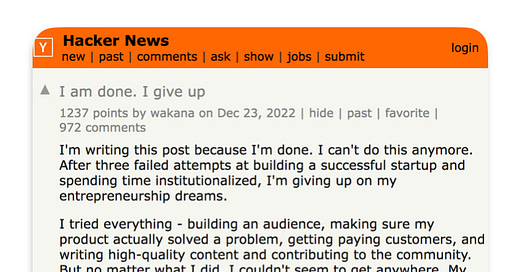Re-reading this old Hacker News post was instructive:
All the key words he used were telling:
“barely had 20 followers”
“substack and product blogs didn’t get any signups”
“few upvotes on Product Hunt”
“never had a paid customer”
“trying to interact and hype up my follow indiehackers on Twitter”
“regularly engaging with their content but no one ever paid any attention to me or followed me back”
" constant stream of digital nomad influencers on Twitter who sell extremely distorted, rosy, and often times false dreams to indie entrepreneurs like myself"
“don’t be fooled by the false promises of digital nomad influencers”
He followed all the common startup porn and tropes, and failed. He engaged on Twitter but people probably saw through the lack of authenticity. He went by a playbook peddled by snake oil startup gurus, but failed to adapt and respond to the market. He felt entitled to results just because he followed the rules. He followed false dreams instead of his own, which he owned up to himself.
Sounds like he was playing entrepreneur like a kid playing house, instead of building a real business while grounded in the real world market realities.
It got me asking myself:
Am I playing entrepreneur, or am I building a real business?
Because both looks the same from the outside, but only one is real.
How does one tell?
Am I following this playbook blindly, just because some influential indie hacker did that?
What’s the cold hard reality of my niche and product space, and why does this hack, method, technique help?
Am I doing it because everyone’s doing it, or because my customers need it or asked for it? (Looking at you, AI)
Am I getting real dopamine from money in the bank, profits, paying customers, freedom, instead of fake dopamine like impressions, likes, email signups, going viral?
Am I building in public because it truly helps my business or my growth as an entrepreneur/indie hacker, or am I just bragging in public?
Are complete strangers paying me money for the product, or are people just being nice and buying it to support me?
Are people just ‘saying’ they will pay, versus actually paid?
Is my product now validated just because it went viral?
Is my business not validated just because folks on Twitter didn’t like it, or ads to my landing page didn’t convert, or was my offer a good fit to the channel I chose?
What other questions would you ask to prevent yourself from falling into the trap of playing entrepreneur?




